Are you struggling to rank your website higher on search engines and finding the right keywords?
Imagine being able to streamline your keyword research process and get help to identify the most effective keywords to target. This is where AI and ChatGPT come to the rescue.
SEO skills are important for any business aiming to boost its online presence and organic Google rankings. However, finding the right keywords can be a challenging and time consuming task, especially if you are not an SEO expert.
ChatGPT, with its advanced natural language processing capabilities, can help you not only identify quality keywords but also save countless hours researching and analyzing them yourself.
With the right prompts, ChatGPT can assist you in generating keyword lists that drive traffic and ultimately, grow your business. You don’t need to be an SEO expert to get started—all you need is the right guidance on using the right prompts to make ChatGPT deliver high-quality keyword research.
Continue into our guide on the best ChatGPT prompts for keyword research. See the prompts that top SEOs are using to save time and be more effective, and learn how you can use them to your own keyword research process.
Let’s start collecting keyword and topic ideas to help target your efforts and create the right pages with the right content.
Already have your keywords settled? Take a look at the best ChatGPT prompts for creating SEO content.
ChatGPT prompts for keyword research
ChatGPT and other AI tools has certain limitations. One of the limitations is, when speaking of keyword research, is that ChatGPT can’t tell you anything about keyword search volume as a regular keyword research tool can and you should use as a supplement – not a substitute.
The following are prompts that I use myself, but remember that you should always edit content generated by ChatGPT no matter how good a prompt you have made to add a personal touch, adding data, statistics, real life experiences, and most important your writing style.
Give the prompts below for keyword research a go:
Everything in green brackets [] are placeholder examples: Replace with your own to get relevant ChatGPT output.
Seed keyword research using ChatGPT
Researching for seed keywords are the first step in the keyword research process. The seed keywords are your main topics or categories that your SEO is going to focus around.
Here is a couple of simple yet great prompts:
Prompt 1: Generate 10 keywords that I can write a targeted blog post about in the [gym] niche
This prompt is an easy one to quickly get some keyword ideas for your main topic and works without many instructions.
Or
Prompt 2: Give me 10 semantically relevant, but unique topics under the main category of [gym exercises]
Instead of “gym exercises” you add your own pillar keyword (broad keyword). Test this prompt using different amounts of topics. For example 10 instead of 30.
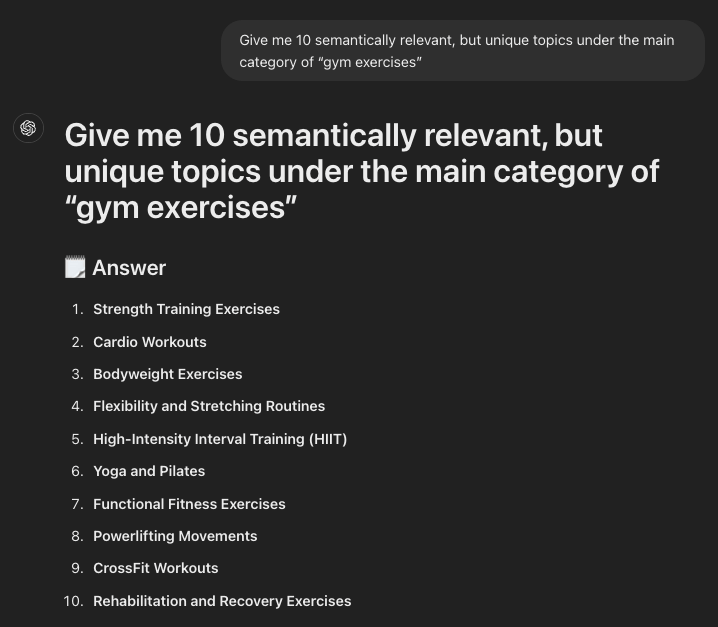
Follow up prompt: When you have received the list, by prompting: Give me 10 different keyword variations of [“cardio workouts”] (one of the topics provided in step 1) that address a different search intent
If the keywords/titles are too long, continue to the next prompt:
Reduce each down to 3-5 word-length keywords.
Try 20 or 30 if the topic seems big enough to contain more keywords.
Topic clustering using ChatGPT
Creating topic clusters is an important part of reaching authority in search engines. This is done by grouping related keywords into one bucket and use it to organize your websites content to cover the full subject and connect all the pages in the cluster using internal links.
Prompt 1: [add list of keywords]. Organize the keywords into relevant keyword clusters.
Add all the keywords from your keyword research or analysis in the brackets.
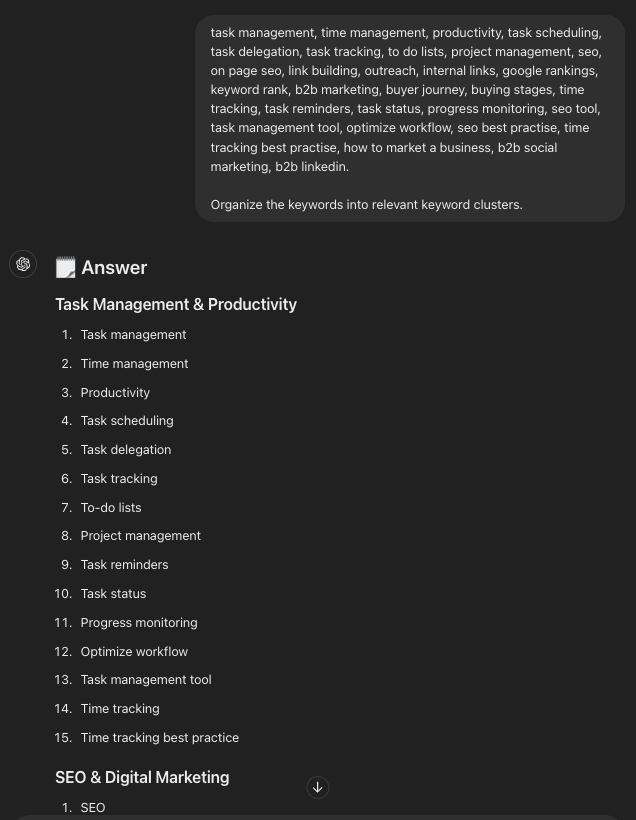
Prompt 2: Create a keyword cluster with relevant keywords for me to target and build landing pages for. I’m selling [sofas, chairs, garden furnitures, dining tables, kitchen tables and carpets].
Replace the products in the brackets with your own product categories.
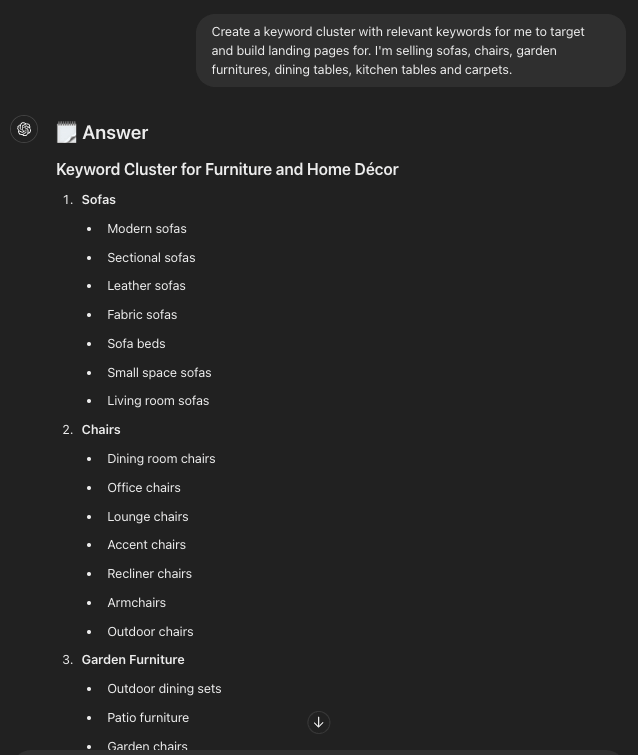
Finding long tail keywords using ChatGPT
Long tail keywords are keywords containing more than a single word. These keywords often has a lower search volume, but higher relevance and conversion rate.
As an extra plus, long tail keywords are also the least competitive keywords compared to high volume short tail keywords. This is your gold mine and here is how you can have ChatGPT identify long tail keywords for you:
Prompt 1: Using [fitness] as the central seed keyword, identify 15 long-tail keywords that potential customers might use when they look for [training programs, inspiration and gym gear].
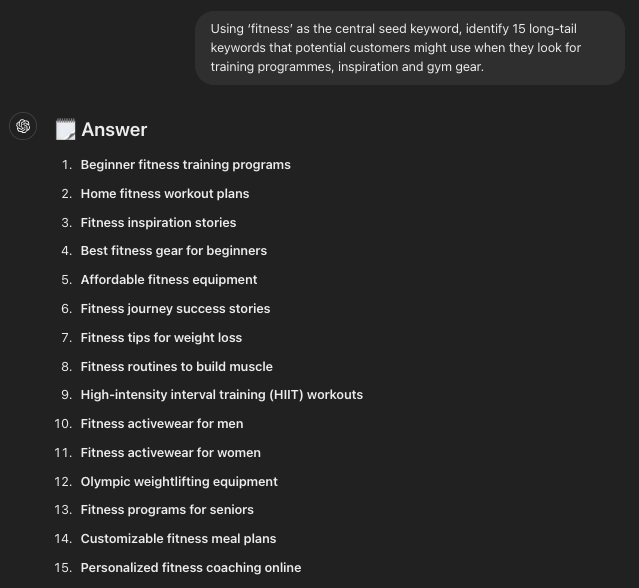
Next, follow up with this prompt:
Follow-up prompt: Which three of the 15 long-tail keywords do you think have the most commercial intent, and why?
Another prompt to try with less instructions:
Give me 15 long tail keywords related to [fitness] with their search intent. Give me the results in a table.
Long tail keywords also provide excellent prompt suggestions for tracking your rankings in ChatGPT
Identify search intent using ChatGPT
Google is at another stage than 10 years ago when it was all about keywords, keywords and keywords in your content. Today, Google weighs the user search intent higher and your content needs to target and address the correct search intent to rank for the query.
Manually sorting keywords based on search intent is a long and daunting process. With ChatGPT those days are over and you can now have ChatGPT sort keyword search intent in a matter of seconds.
When you have a list of keywords from the previous steps or from a previous keyword analysis you can use this ChatGPT prompt:
Prompt 1: Categorize the keywords below based on their search intents – informational, navigational, commercial, and transactional. Give me the results in a table
[copy/paste your keywords]
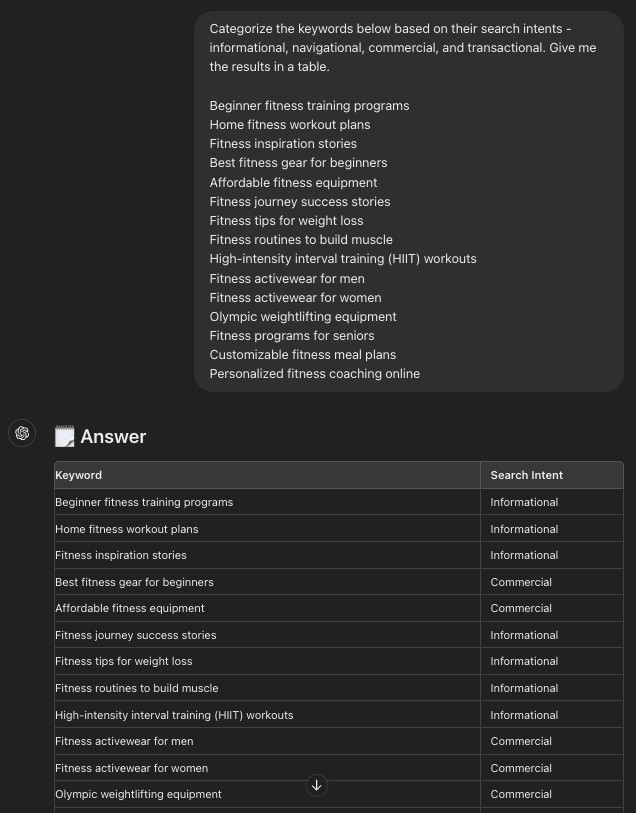
Additional keyword research prompts
The list above is not the only right way of doing keyword research with ChatGPT and other prompts will work just fine.
Try the following prompts:
- Generate a list of high-volume keywords for the [industry] niche.
- Identify long-tail keywords related to [main keyword].
- Cluster the following keywords into relevant groups: [list of keywords].
- Provide keyword ideas for a blog post about [topic].
- Analyze the competition for the keyword [specific keyword].
- Find low competition keywords in the [industry] sector.
- Suggest keywords for an e-commerce store selling [product].
- Generate keyword ideas for a local business in [location].
- List the top-performing keywords for [competitor’s website].
- Identify seasonal keywords for the holiday season in [industry].
- Create a keyword map for a website focusing on [topic].
- Find keyword opportunities for improving search engine ranking for [website].
- Generate long-tail keyword phrases that include [seed keyword].
- Group the following keywords into logical clusters: [list of keywords].
- Analyze the keyword trends for the past year in the [industry] niche.
- Suggest keywords to target for a new blog about [topic].
- Identify the best keywords for PPC campaigns in the [sector].
- Find related keywords for the search term [main keyword].
- Provide keyword suggestions for a YouTube video about [topic].
- Analyze keyword difficulty for ranking on the first page for [specific keyword].
Do you have an awesome prompt or set of prompts that are gold for doing keyword research?
Feel free to drop us a message on our chat with your favorite keyword research prompt!

